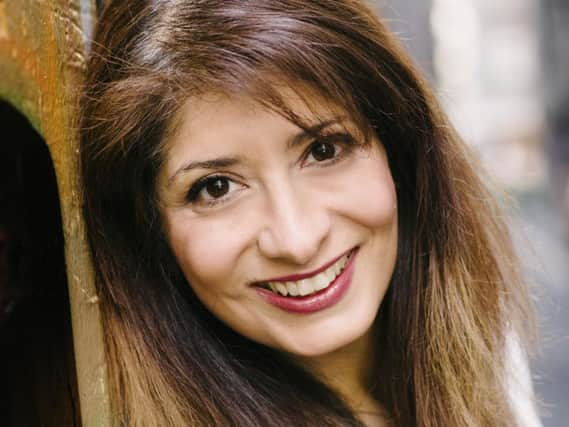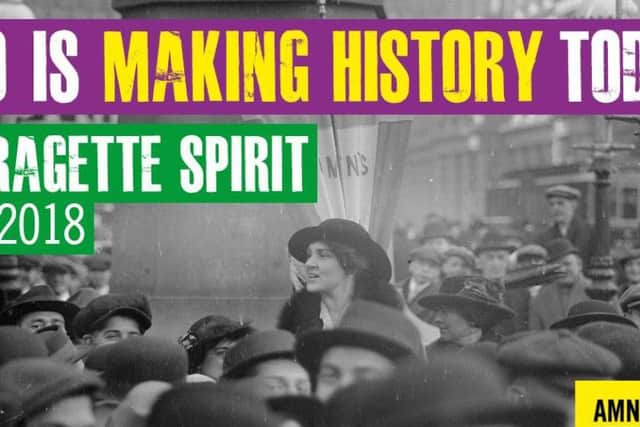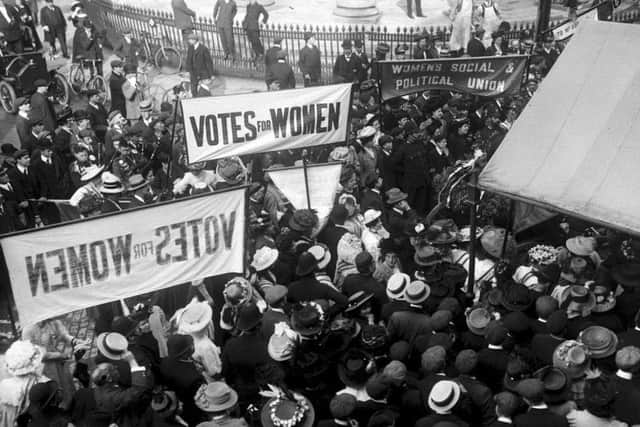Celebrate Sheffield women who follow in Suffragettes' footsteps


For the first time, many mothers, daughters and sisters could have a say in how their country was run.
Suffragettes would stop at almost nothing to get their voices heard in parliament. The struggle to win the vote was long and arduous but in 1918 these brave women won.


Advertisement
Hide AdAdvertisement
Hide AdSince then, women around the world have channelled the suffragette spirit to campaign for progress. They have stood up to racism, sexism, homophobia, corruption and much more.
Last century’s suffragettes are today’s women human rights defenders.
Amnesty International campaigns to help protect women human rights defenders around the world. These brave campaigners often face surveillance, intimidation, threats, imprisonment and some even risk their lives. But you don’t need to travel thousands of miles to meet women fighting for justice and equality. In fact, there’s probably a woman human rights defender living at your doorstep.
This is why Amnesty wants readers to nominate the incredible women who are making a real difference in their area. Ordinary women from all walks of life are doing extraordinary things.


Advertisement
Hide AdAdvertisement
Hide AdThey might have stood up to bullies, helped the homeless, aided refugees, protected the environment or campaigned for better access to healthcare.
Every time these women have spoken up, they’ve helped make life better for others – to ensure that you and I and future generations enjoy a fairer, more equal world.
The achievements of often-unsung heroes deserve to be celebrated and Amnesty wants to put them on its Suffragette Spirit Map of Britain.
The interactive map, which will launch on International Women’s Day, Sunday, March 8, will be a symbol of the suffragette legacy – proudly displaying how far we have come over the past century, but highlighting how much life-changing work is still being carried out today.


Advertisement
Hide AdAdvertisement
Hide AdSo, over to you: which 21st century-suffragette deserves to be put firmly on the map?
To nominate a woman, visit www.amnesty.org.uk/suffragettespirit. Women must have carried out work to help others in their local area within the last 10 years. Successful nominees will be contacted to give consent prior to being placed on the Suffragette Spirit Map. This campaign has been funded by People’s Postcode Lottery.
The struggle by British women for suffrage began in the mid-19th century. Sheffield was the first place in the country to have formed a women’s suffrage society run by women for women – The Sheffield Women’s Political Association. The inaugural meeting was held on February 26, 1851 at the Democratic Temperance Hotel.
When men were called up for military service in World Wa One, Sheffield steel firms and others began to recruit women for jobs previously unavailable to them. Simplex Motor Works at Tinsley and Cammell Laird and Co employed women in shell manufacture and file grinding.


Advertisement
Hide AdAdvertisement
Hide AdOnce the war was over women found themselves back in their homes, having lost their new-found freedom and economic independence.
The Women’s Social and Political Union (WSPU) was founded in 1903 by Emmeline Pankhurst.
Since 1869 only women ratepayers had been allowed to vote and then only in local elections. The WSPU aimed at extending the vote to all women in national elections.
The militant side of the suffrage movement was lively in Sheffield and Mrs Pankhurst sent her daughter Adela to be a WSPU organiser. A ‘suffrage shop’ was opened at 26-28 Chapel Walk and in 1908 an attempt was made to enter the Cutlers’ Feast, where the First Lord of the Admiralty was guest speaker.
Advertisement
Hide AdAdvertisement
Hide AdAdela Pankhurst disguised herself as a kitchen maid and tried to get in but was stopped by the police. She made a speech from the Town Hall steps, was moved on by the police and went back again but failed to get in.
The Representation of the People Act in 1918 enabled women over 30 to vote. It was not until 1928 that the voting age was reduced to 21.
Eleanor Barton was the first woman elected to Sheffield Council in 1919 and by 1920 three per cent of city councillors were women. In 1936 Ann Eliza Longden became first female mayor of Sheffield and Grace Tebbutt was first female leader of Sheffield Council in the 1950s.